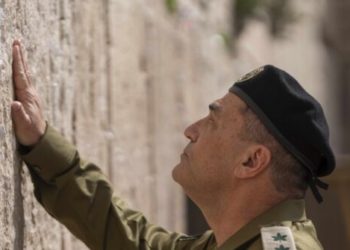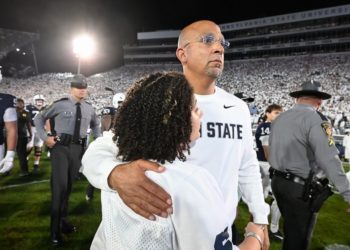The giant flags, unfurled about five minutes before kickoff, had nothing to do with the two teams about to play in a match that would help determine qualification for next year’s World Cup, global soccer’s biggest event.
As the national teams from Norway and Israel prepared to take the field on Saturday night, Norwegian fans raised a Palestinian tricolor flag and a banner that read “Let Children Live.” Moments later, as Israel’s players lined up and their national anthem played, some in the home crowd booed and whistled.
The scene and a pregame protest march by about 1,500 people were examples of how the world’s most popular sport has become a venue for demonstrations against Israel’s prosecution of the war in Gaza. They are likely to persist even after a cease-fire took hold that mediators hoped would lead to the end of the two-year war. Israeli soccer officials expected more protests at the team’s next World Cup qualifier in Udine, in northern Italy, on Tuesday.
“It is our reality today,” Israel’s goalkeeper Daniel Peretz said after conceding all the goals in a chastening 5-0 defeat for his team.
From a soccer standpoint, the match was high-profile. It was billed as one of the most important in Norway’s soccer history, putting the country one victory away from returning to the men’s World Cup after nearly 30 years.
However, many Norwegian soccer officials and fans have long been outspoken about Israeli participation in the World Cup and viewed the match as an opportunity to highlight their message. Norway’s soccer federation announced months earlier that it would donate the proceeds from Saturday’s match to Doctors Without Borders for humanitarian work in Gaza. A team sponsor said it would also donate 300,000 euros, or about $350,000.
In a corner of Andy’s Pub, a soccer-themed bar in Oslo, about a half dozen men from Tromso, a city close to the Arctic Circle, were downing beers before the match and dressed in Norwegian jerseys from the 1990s, when the team last played in the World Cup. But they were missing one of their regulars. Ronny Jordness, 55, said his brother Kurt was boycotting the game.
“I tried to convince him that all the money goes to Gaza so he should come, but I was still not able to,” Mr. Jordness said.
Israeli officials were frustrated that the Norwegians had singled out the game for the charity donation, and reporters traveling with the team aggressively questioned Lise Klaveness, Norway soccer’s president, about it and other issues in a feisty news conference the day before the game.
Ms. Klaveness has been a focus of Israeli anger. She has said Israel should be barred from global soccer, as Russia has been since it began its full-scale invasion of Ukraine in 2022. She has accused Israel of breaching the rules of FIFA, the sport’s governing body, including with teams in its professional soccer league that play from Israeli settlements in the West Bank, and she has criticized FIFA for taking nearly two years to investigate the issue.
The donation, Ms. Klaveness said in an interview at her office on Saturday, was made in part to convince Norwegians that it was acceptable to support their team. “We knew that it will be a very political backdrop to the game and people will find it very difficult in Norway to come to the game and support Norway,” she said.
Outside in Oslo, organizers of a pro-Palestinian protest held a rally to kick off a 90-minute march through the city to the stadium. They attracted support from passers-by who cheered from apartment windows and vehicles that had stopped to let them pass.
The organizers said that the cease-fire deal in Gaza didn’t go far enough. Under the plan, Hamas agreed to release the remaining hostages it took during its Oct. 7, 2023, attack in exchange for the return of Palestinian prisoners and the partial withdrawal of Israeli troops.
“It’s not the end of the occupation,” said Line Khateeb, one of the protest’s organizers. “It doesn’t mean the West Bank is free. It doesn’t mean Palestine is free. We need to keep pushing and putting sanctions on Israel to hold them accountable in order to have a proper free Palestine.”
The security operation for the game, which included a no-fly zone over the stadium and road closures, was the biggest for any sporting event in Norway since it hosted the Winter Olympics in 1994. Israel’s 60-person traveling contingent included 16 security agents. Outside, the police arrested more than 20 protesters.
The emotions of the moment are a constant accompaniment to Israel’s national team.
Coach Ran Ben-Shimon theatrically pulled a light blue kipa out of his pocket halfway through a news conference before the match, placed it on his head and said a prayer in Hebrew for the return of the remaining hostages and soldiers in Gaza.
“I feel like here, I am a politician from the government of Israel rather than a footballer who is supposed to play tomorrow against Norway,” the team’s captain, Eli Dasa, said at one point, growing frustrated at the line of questioning. Before a game two years ago, he displayed what he said was a soccer shoe that belonged to an Israeli child kidnapped by Hamas on Oct. 7.
Other Israeli teams have also faced antisemitic attacks since the war began. Dozens of people were arrested in Amsterdam last November over what officials described as antisemitic attacks on fans of the Israeli team Maccabi Tel Aviv, as well as over vandalism and inflammatory behavior on both sides at a European club match, including anti-Arab chants.
While Norway soccer officials had long called for barring Israel from competition, other countries moved in that direction more recently as opinion in Europe over the conflict in Gaza began to shift more decisively against Israel.
In recent weeks, reports had begun to emerge that European soccer leaders were moving to bar Israeli teams from competition. Israeli teams have traditionally played against European national and club organizations. Talk of a meeting to decide on a possible ban began to intensify, Ms. Klaveness said.
Then, President Trump announced a comprehensive peace plan alongside Prime Minister Benjamin Netanyahu of Israel and pressed Hamas to agree to it. In addition to the major diplomatic implications, the plan eased the intensifying discussions to bar Israel’s soccer team.
“It was a real movement to have a meeting,” Ms. Klaveness said. “But then the peace talks started, and then everything cooled down.”
Soccer officials, too, have been affected. Protesters appeared outside the homes of the Italian soccer president, Gabriele Gravina, and the national team coach, Gennaro Gattuso. Mr. Gattuso said last week that he expected more demonstrators outside Stadio Friuli in Udine than fans inside for Tuesday’s qualifying match between Israel and Italy.
FIFA’s president, Gianni Infantino, an ally of Mr. Trump’s, sought last week to calm fan opposition to Israel.
“Now there is a cease-fire; everyone should be happy about that,” Mr. Infantino said on the sidelines of a meeting of European soccer executives in Rome. “Everyone should support that process.”
As the game in Oslo approached its end, with Norwegian fans jubilant and on the cusp of returning to the World Cup, a megaphone that had been used to start chants for Norway was handed to a man in a kaffiyeh, a symbol of the Palestinian resistance movement. Moments later, the words “Free, free Palestine” rang out.
Tariq Panja is a global sports correspondent, focusing on stories where money, geopolitics and crime intersect with the sports world.
The post World Cup Qualifiers Become a Venue for European Protests of Israel appeared first on New York Times.




